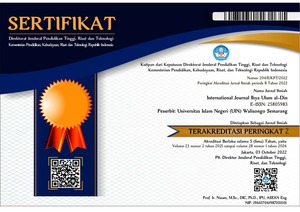Resilience in Santri: The Impact of Social Support on the Quran Memorization Journey
DOI:
https://doi.org/10.21580/ihya.26.2.23726Keywords:
Resilience, Quran memorizers, Social SupportAbstract
Santri who attend school and simultaneously memorize the Quran in Pondok Pesantren face greater challenges than their peers. This study explores the forms of social support that can improve the resilience of santri who memorize the Quran. This study used a non-experimental quantitative approach involving 180 students in five Islamic boarding schools in Central Java. Hypothesis testing was conducted using Hierarchical Linear Regression. The results showed that emotional support (β=0.306, p<0.01) and informational support (β=0.237, p<0.01) significantly predicted resilience, while instrumental support did not (β=0.154, p>0.05). Furthermore, social support in the form of friendship increased students' resilience to 42.7% (R²=0.427, F(1,175)=9.730, p<0.001). These findings demonstrate the importance of peer support, guidance from religious teachers (kyai), and a supportive environment in the process of memorizing the Quran. This study shows that for Quran memorizers, resilience is strengthened through togetherness, guidance, and emotional support that collectively enable them to face spiritual and academic challenges.
Downloads
References
Ariyati, I. (2016). Problematika siswa dalam menghafal Al-Qur'an: Studi kasus 4 siswa kelas XII agama MAN Wonokromo Bantul, Yogyakarta. UIN Sunan Kalijaga.
Bonanno, G. A. (2004). Loss, trauma, and human resilience: Have we underestimated the human capacity to thrive after extremely aversive events? American Psychologist, 59(1), 20–28. https://doi.org/10.1037/0003-066X.59.1.20
Connor, K. M., & Davidson, J. R. T. (2003). Development of a new resilience scale: The Connor-Davidson Resilience Scale (CD-RISC). Depression and Anxiety, 18(2), 76–82. https://doi.org/10.1002/da.10113
Dzulkifli, M. A., & Mahudin, N. D. M. (2021). Contextualising Islam in psychological research. IIUM Press.
Garmezy, N. (1991). Resilience and vulnerability to adverse developmental outcomes associated with poverty. American Behavioral Scientist, 34(4), 416–430. https://doi.org/10.1177/0002764291034004005
Grotberg, E. H. (1995). A guide to promoting resilience in children: Strengthening the human spirit. Bernard van Leer Foundation.
Haque, A., & Keshavarzi, H. (2014). Integrating indigenous healing methods in therapy: Muslim beliefs and practices. International Journal of Culture and Mental Health. Retrieved November 8, 2024, from https://doi.org/10.1080/17542863.2014.897348
Hunter, A. J., & Chandler, G. E. (1999). Adolescent resilience. Image: The Journal of Nursing Scholarship, 31(3), 243–247. https://doi.org/10.1111/j.1547-5069.1999.tb00488.x
Karatsoreos, I. N., & McEwen, B. S. (2013). Psychobiological mechanisms of resilience: Stress, allostasis, and the brain. Neurobiology of Stress, 2, 112–121. https://doi.org/10.1016/j.ynstr.2015.04.002
Kurniawati, D., & Fauzi, A. (2021). The role of informational support in enhancing confidence and problem-solving skills in students. Journal of Educational Psychology, 45(2), 203–214. https://doi.org/10.1080/01443410.2021.1900134
Lestari, W., & Rahayu, N. (2023). Emotional resilience in dormitory settings: The importance of close-knit friendships. International Journal of Social Psychology, 52(2), 189–201. https://doi.org/10.1016/j.ijsp.2023.01.005
Luthans, F., Avolio, B. J., Walumbwa, F. O., & Li, W. (2005). The psychological capital of employees: A positive organizational behavior approach. Journal of Organizational Behavior, 26(3), 241–255. https://doi.org/10.1002/job.283
Luthans, F., Avolio, B. J., Walumbwa, F. O., & Li, W. (2006). The psychological capital of employees: A positive organizational behavior approach. Journal of Organizational Behavior, 27(3), 241–255. https://doi.org/10.1002/job.283
Masten, A. S. (2001). Ordinary magic: Resilience processes in development. American Psychologist, 56(3), 227–238. https://doi.org/10.1037/0003-066X.56.3.227
Masten, A. S., Best, K. M., & Garmezy, N. (1990). Resilience and development: Contributions from the study of children who overcome adversity. Development and Psychopathology, 2(4), 425–444. https://doi.org/10.1017/S0954579400005812
Pargament, K. I. (1997). Psychological aspects of religious coping: A conceptual overview. In W. R. Miller & J. D. L. Moore (Eds.), Handbook of the psychology of religion and spirituality (pp. 435–451). The Guilford Press.
Putri, N., Santoso, P., & Sari, Y. (2020). Informational support in enhancing problem-solving skills among students. Journal of Educational Psychology, 32(3), 290–301. https://doi.org/10.1016/j.jedpsy.2020.07.003
Reivich, K., & Shatté, A. (2002). The resilience factor: 7 keys to finding your inner strength and overcoming life’s hurdles. Broadway Books.
Sari, L. S., & Supardi, A. (2020). The role of emotional support in helping students cope with academic pressures. International Journal of Educational Psychology, 15(2), 120–135. https://doi.org/10.1016/j.ijep.2020.03.008
Sarafino, E. P., & Smith, T. W. (2017). Health psychology: Biopsychosocial interactions (9th ed.). Wiley.
Santoso, E., Kurniawati, S., & Fauzi, H. (2019). Peer-to-peer knowledge exchange and its impact on resilience in educational settings. Journal of Educational Development, 36(4), 400–410. https://doi.org/10.1016/j.jeddev.2019.10.008
Werner, E. E., & Smith, R. S. (1992). Overcoming the odds: High risk children from birth to adulthood. Cornell University Press.
Werner, E. E., & Smith, R. S. (2001). Journeys from childhood to midlife: Risk, resilience, and recovery. Cornell University Press.
Wahyudi, S., Fauzan, S., & Rahman, M. (2022). Goals and resilience in the context of students away from home. Journal of Educational Development, 31(2), 150–160. https://doi.org/10.1016/j.jeddev.2022.05.004
Wong, P. T. P., Wong, L. C. J., & Scott, C. (2006). Beyond stress and coping: The positive psychology of transformation. In P. T. P. Wong & L. C. J. Wong (Eds.), Handbook of multicultural perspectives on stress and coping (pp. 15–30). Springer.
Zautra, A. J., Hall, J. S., & Murray, K. E. (2010). Resilience: A new definition of health for people and communities. Springer.
Downloads
Published
How to Cite
Issue
Section
License
Copyright (c) 2024 International Journal Ihya' 'Ulum al-Din

This work is licensed under a Creative Commons Attribution 4.0 International License.
By submitting an article to the journal, the author(s) agree to transfer the published article's copyright to the journal, which will act as the publisher. This means the journal will have the right to publish the article in various forms, including reprints. The journal will maintain the publishing rights to the published articles.
This work is licensed under Creative Commons Attribution-ShareAlike 4.0 International License.
In line with the license, authors and third parties (readers, researchers, and others) are allowed to share and adapt the material. In addition, the material must be given appropriate credit, provided with a link to the license, and indicated if changes were made. If authors remix, transform or build upon the material, authors must distribute their contributions under the same license as the original.



